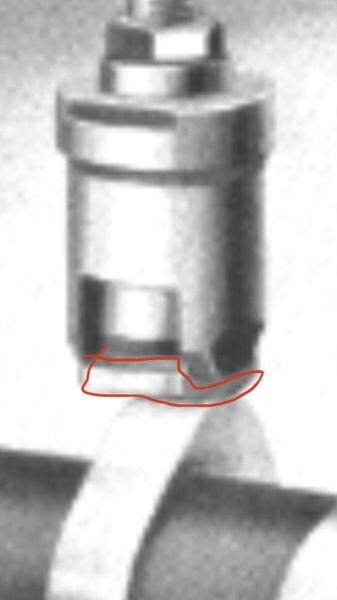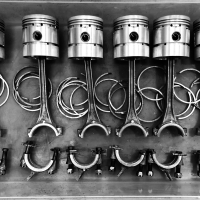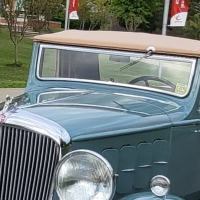Aluminum Gear Set & Thrust washer
I need to take apart the front of my 37’s 212ci engine and check/replace the cam gear & thrust washer as I have no idea the condition. Thus I’d like to find an aluminum cam gear &/or aluminum gear set. I was also wondering if there is an improved cam thrust washer instead of fiber, maybe brass?
0
Comments
-
They used fiber to keep it quite metal gears are louder when running the engine0
-
BigSky, I made this change several years ago when rebuilding my 36 212. I don't have a source of parts for you, but they can be found. I do have the printed instructions for making the gear change. Essentially you replace the fiber cam gear with one of aluminum AND you have to change the steel crankshaft gear. You cannot retain the OEM crank gear, as it does not mate with the replacement cam gear. There is just a little bit of machining (grinding) required behind the new cam gear (it is simple). I don't notice much of a sound change in the engine and my hearing is excellent (I maybe notice a little more resonance when it's running and parked on the wooden barn floor, but on terra firma, no difference). For the thrust washer, I used a NOS fiber washer, but yes, I have since heard of someone making them of brass or the like. I wish I could direct you to someone who has the parts right now, but I'm mainly weighing in to let you know that I have successfully made the swap and am very pleased with it.0
-
Is there any way of testing whether the thrust washer is in place and any good without taking off the timing gear?
0 -
Denzil, you could take either sump or the timing case off, to sight this, but there is no other way of testing. And in any case, if the car has been running for any length of time with the thrust washer missing the lifters will have to be refaced. Of course you should always use a high-zinc oil in these engines as they are prone to extreme cam and lifter wear. And if there is no thrust washer there, the camshaft has to come out to fit it.
Geoff
0 -
I definitely wish there was a way to check before I pull everything apart but it sounds like that’s not really possible.I’ll have to get one of the brass thrust washers from Doug, it looks nice. Hopefully it’s not missing but I appreciate the heads up on possible need of cam & lifter re-grinds if missing. I didn’t know that one but makes sense if the cam is moving back & forth, that damage would likely occur.
hasktavern: any chance you can email me the instructions?
If anyone knows where I can pick up an aluminum cam gear or the matched Cam & Crank gear set please let me know! Thanks!0 -
Ken, your method will not work on splasher engines, only later models.0
-
Bigsky, the camshaft will not move back and forth, it is constantly held in the rearward position by the angle of the gears forcing it backwards when running. Hence, if it has been running without a thrust washer, there will be a wear pattern towards the rear of the lifter faces. If this is worn, and you try and install a new thrust washer, it will bring the unmatched portions of the lifter back on to the cams, leading to a difference in tappet clearances, and advanced wear on the cam surfaces. If there is a groove worn in the lifters then you will have difficulty moving the camshaft forward anyway.
I would recommend that you remove one lifter and examine it. If the wear pattern is in the centre of the face then the thrust washer is okay. You can do this without removing the cylinder head. Using a scissor type valve spring lifter, raise the spring and remove the retainer. Then wedge the valve up as far as it will go and spiral the spring out, manoeuvring it past the tappet bolt. Remove the clamp and lift the follower out. Ideally, the wear pattern will be in the centre of the face, and parallel to the sides. if it is at an angle the lifter has not been properly aligned and will have to be re-faced, and properly aligned when re-installed. Good luck
0 -
What has lead me to believe I need to change those things is this: I have a rattling noise coming from the engine that I can’t figure out. I have been told that “it’s just how they sound” however I have a hard time believing it’s supposed to sound that way. I’m attaching a couple videos for anyone’s thoughts....
1st video is from 13 months ago before the engine was refreshed. One can hear a rattling noise which comes & goes in volume.0 -
I can't hear the noise sufficiently on my tiddly computer, but I suspect what you have is a case of a worn timing gear, which causes the con rods to connect with the lobes of the camshaft at certain speeds. Did you fit a new timing gear? If not this is a must, preferably a matched set of alloy/steel '41-52 version. If you haven't got this, then at least fit a new fibre gear.
What load of codswallop some people spout! "Just how they sound "!!! how stupid.
0 -
Geoff, do you have a feel for the life expectancy of the fibre timing gear(s)? My 35 T has slightly over 30K original miles and I'm getting nervous. I purchased a set of aluminum gears a number of years ago and I'm thinking it's time for the change.0
-
No I don't. Some last for 100,000 miles, others pack up much earlier. It's very much a game of Russian Roulette. Change them!0
-
Two or 3 years ago I went to change the fibre timing gear on a 35 H8 to find nary a trace of a cam thrust washer, so valves out, cam out, grind the grooves out of the lifters etc.
What I thought was interesting, and I don't know if it was a deliberate design decision on Hudson's part, was that with the cam right back in the block the cam lobes don't collide with anything. It was very close, if the cam could go maybe another 10 thou further back the damage would have been a lot more serious, but fortunately not.0 -
I ran across this image and got to looking at it & wondered if the part of the lifter in red maybe colliding with the surrounding lifter housing as it goes up & down, thus giving some of the rattling I’m hearing?

0 -
The sides of the lifter housing can snap off if when you adjust the valve clearances you don't use a spanner to hold the lifter housing from turning when you tighten or loosen the locknut.
0 -
I thought the roller style lifters were quieter?0
-
The lifter can not come out of the guide, so that is not a source of noise. If the noise comes in at a certain speed range it indicates the timing gear is worn, the teeth are flexing and retarding the valve timing, and the con rods colliding with the cams. or it could be loose con rod bearings, grooves worn in the lifters, worn cams - any number of things.0
-
They say the 212 is a tough engine. I guess it is: I rebuilt mine which had put over 90K miles on in the cold mountainous region of Colorado, and I have a feeling the owner didn't always wait for it to warm up before taking off. It was still running when I took it apart, but quite 'rattly'. The cam lobes were worn down to mere nubs (that's no exaggeration), with matching worn and gouged lifters. The valves, at full adjustment, were lifting no more than a cat's whisker. Needless to say, I replaced the camshaft, the lifters (and also the gearset and thrust washer, as indicated in my other post). Now, it's a nice quiet valve train, very soothing to the ear. Bigsky, I will send you the original printed instruction sheet.0
Categories
- 37K All Categories
- 116 Hudson 1916 - 1929
- 21 Upcoming Events
- 96 Essex Super 6
- 28.6K HUDSON
- 576 "How To" - Skills, mechanical and other wise
- 995 Street Rods
- 151 American Motors
- 181 The Flathead Forum
- 49 Manuals, etc,.
- 78 Hudson 8
- 44 FORUM - Instructions and Tips on using the forum
- 2.8K CLASSIFIEDS
- 609 Vehicles
- 2.2K Parts & Pieces
- 78 Literature & Memorabilia
- Hudson 1916 - 1929 Yahoo Groups Archived Photos




